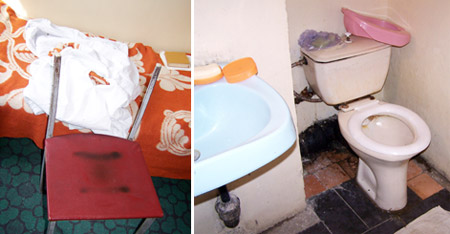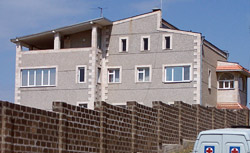My grandmother got really sick recently and the ambulance took her to the “Armenia” hospital (state hospital). At the reception, they asked for the fixed 80,000 AMD, which I paid, certain that the doctors will treat my grandmother well. But when they transferred her to the no. 118 room of the neurology department, I realized that the patients treated in that department mustn’t realize where they are and how they got there for the first couple of days.

At the room, I found out that the “free” night shifts were unavailable because at that hour (9:00 p.m.) the elder nurse had already left. In times like these, the relatives of the patient decide to either have the patient spend the night in a humid and uncomfortable room, or the relatives have to find a night shift for 4,000 drams quickly. I picked this last one and tried to guess what services the 80,000 AMD includes. The 80,000 AMD included the required “Piratsetam” medicine (the price for one tube is 410 drams). But it turned out that that medicine wasn’t really effective. The doctors recommended buying the “Mexidol” drug from the hospital pharmacy. One tube costs 820 drams and the patient needs four doses of this medicine a day…
So, my grandmother and I settled down in room 118. However, it wasn’t necessary to lay the patient down on the bed right away because there were many liquid stains on the mattress. The dirt on the pillows and the mysterious material (neither feather nor wool) forced us to go back home and bring a normal bed.
 One of my grandmother’s relatives had to stay with her at the hospital. The “service” in that room cost 40,000 AMD for a week. I paid hoping that at least the conditions would be a little normal. As if being depressed and desperate wasn’t enough, now I had my grandmother, the sanitarian, holding her mattress sheets. Using the word white mattress sheets here is very conditional: a bright gray mattress and the cover of a blanket. Besides the fact that they were full of blood and other stains, they were also ripped and had big holes (see the picture). The defects of the hospital room could be seen under one electric lamp (the other one was severely tarnished) and the sunrise. You had to be blind not to see the floor with the ends covered in cement. There is no need to describe the bathroom and other “parts” of the room-the pictures say it all.
One of my grandmother’s relatives had to stay with her at the hospital. The “service” in that room cost 40,000 AMD for a week. I paid hoping that at least the conditions would be a little normal. As if being depressed and desperate wasn’t enough, now I had my grandmother, the sanitarian, holding her mattress sheets. Using the word white mattress sheets here is very conditional: a bright gray mattress and the cover of a blanket. Besides the fact that they were full of blood and other stains, they were also ripped and had big holes (see the picture). The defects of the hospital room could be seen under one electric lamp (the other one was severely tarnished) and the sunrise. You had to be blind not to see the floor with the ends covered in cement. There is no need to describe the bathroom and other “parts” of the room-the pictures say it all.
The owner of this grand villa (see the picture) is the general doctor of the state hospital Garik Grigoryan (he is also one of the owners of the hospital). This is the first time that I am violating the rules of being a journalist by not asking Grigoryan’s opinion because each and every detail of the room says it all. I’m sure that Garik Grigoryan has done everything to make sure he lives a long, healthy life in his villa. I’m certain that Mr. Grigoryan will never sleep in a dirty bed with ripped mattress sheets, or use a bathroom, which he offers the ill patients. The hospital charges 120,000 drams from the patient and the caretaker for one week, but they treat the patients like homeless people. They provide them with tarnished beds, a disgusting bathroom and dangerous plug outlets. In a word, a melancholic place called “Room no. 118”. The hospital is Mr. Grigoryan’s second home. The territory where my grandmother spent her last days and where tens of other patients try to live is a hospital room and the patients that get there have one thing to console about-they won’t regret dying.
